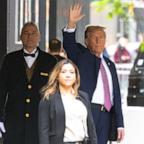Did 'Power of Touch' Help Giffords From Brink?
Love and support has made all the difference, doctors say.
Jan. 13, 2011— -- Five days after being shot in the head, Rep. Gabrielle Giffords opened her eyes of her own accord.
In a display that surprised doctors and elicited tears of joy from her loved ones who were present, Giffords reportedly reached out toward husband Mark Kelly in an attempt to give him a hug.
Doctors say it is difficult to tell whether the frequent company and physical contact she has had with her loved ones contributed to what her physicians are calling a quick recovery -- but some medical experts say it is possible.
Giffords began the struggle to open her eyes and lift her left arm in response to the support and encouragement of friends Sen. Kirstin Gillibrand and Rep. Debbie Wasserman Schultz, who visited Giffords at the hospital Wednesday evening.
"It was just, really, it felt like a miracle," Schultz, a Florida Democrat, recounted to reporters on the return trip from Tucson aboard Air Force One. "It felt like we were watching a miracle. [W]e just both wanted so badly to be there for her as her friends.
"But you could ... clearly see the determination in her face that she was struggling to get her eyes open because she was responding to our voices. It was like she wanted us to know that she knew we were ... there."
In response to the doctor's examinations, Giffords had been partially opening her eyes starting Sunday, but Wednesday evening marked the first time she opened them voluntarily in response to the "familiar" presence of others.
Such a response is "very different" in terms of measuring recovery, Giffords' doctor, Dr. Michael Lemole, said at a news conference today.
Soon after opening her eyes in response to commands, Giffords' husband urged her to give them the thumbs up, and instead she stretched her left arm toward him
"And we were just in tears of joy watching this and beyond ourselves, honestly," Gillibrand, a New York Democrat, told reporters. "And then Mark said, 'You know, touch my ring, touch my ring.' And she touches his ring and then she grabs his whole watch and wrist. And then the doctor was just so excited.
"He said, 'You don't understand, this is amazing, what's she's doing right now, and beyond our greatest hopes.'"
Dozens of doctors across various medical specialties expressed their thoughts to ABC News on how patients might be helped by touching and other forms of physical contact with friends and loved ones.
Some supported the idea; others were skeptical. But Lemole, chief of neurosurgery at the University of Arizona, agreed with Gillibrand and Schwartz that the presence of close friends had made all the difference.
"Dr. Lemole ... literally said to us, 'You know, I've discounted ... emotion ... and friendship and family -- really, I've sort of discounted that as meaningless out loud,'" Schultz said. "He said, 'I just witnessed the impact of friendship and what you guys' -- he said, 'you did this here today.'"




